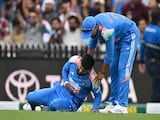The NHRC on Wednesday said all the 46 government-run mental healthcare institutions across the country are in "deplorable conditions", as it issued notices to the Centre and state governments asking them to submit their reports in six weeks.
The human rights panel's observations have come on the basis of the visits of the full commission to four government hospitals in Gwalior, Agra and Ranchi, and the remaining 42 by its special rapporteurs in various parts of the country in the last few months to assess the situation on the ground and the status of the implementation of the Mental Healthcare Act, 2017, officials said.
The National Human Rights Commission in a statement said that "all the 46 government mental healthcare institutions across the country are in deplorable conditions and depict a very pathetic handling by the different stakeholders".
"The inhuman and deplorable conditions of the mental health institutes recorded by it across the country, present sorry states of affairs amounting to infringement of the human rights of mentally ill patients. The cured patients are being kept illegally in the hospitals. There is acute shortage of doctors and staff," it said.
The reports of the visits have prompted it to take suo motu cognisance of the matter and issue notices to the Union Health and Family Welfare secretary; Director General of Health Services; chief secretaries and principal secretaries, health; director general of police and commissioner of police in metropolitan cities of all the state governments as well as Union territories, and directors of 46 mental institutions across the country calling for the specific reports and detailed action taken reports within six weeks, the statement said.
The chief secretaries, secretaries of health, and UT administrators have to submit an action taken report on how the cured patients are being kept illegally in mental hospitals by curtailing their liberty.
All such patients are to be sent back to their homes/halfway homes as per rules, the NHRC said, and also sought reports "on status of formation of Mental Health Authority, State Mental Health Review Board, State Mental Health Care Rules, and State Mental Health Care Regulation".
Also, they are to provide details on budgetary allocation and funds released with regard to the mental health institutions; state of the infrastructure of the institutes, plan for improvement of the buildings which include various amenities; status of the recruitment process of the health professionals including hospital staff; and measures taken to ensure de-crowding of mental hospitals/institutes, the statement said.
The NHRC also asked the authorities to create a conducive atmosphere for stay. Details have also been sought on status of emergency services, maintenance of electronic data and medical records, measures and initiatives taken for reintegration and rehabilitation of the cured patients; statistics regarding discharged patients of last five years and their rehabilitation, reunion with the family or community, how many of them have become new inmates again, and status of number of such persons staying in the hospital with reasons thereof; and financial or social audit report of last three years, it said.
The Union Health and Family Welfare Secretary and Director General of Health Services have to submit the report on the status of framing rules under the 2017 Act as contemplated under Section 121 of the Act, as well as the establishment of the Central Authority as contemplated under Section 33 of the Act, and filling up the vacancies of the Central Authority and status of execution of various provisions of the Act by the Central government, the statement said.
The reports from the directors of the 46 mental institutions should include the steps taken or proposed to be taken for filling up the vacancies of professors and other staff members; records of the discharged patients, who have been cured from mental illness, latest status of the emergency ward and other overall improvement made after the visits of Commission and/or special rapporteurs of the Commission with regard to infrastructure, vocational opportunities to the inmates, number of persons released and reunited with the family members with specific statistics, it added.
The DGP and commissioner of police in the metropolitan cities of all states and Union territories have to submit reports with regard to the status of the complaints received or registered relating to mentally ill-persons, regarding non-rehabilitation or non-reintegration with the family and measures taken or proposed to be taken to ensure that cured persons from mental illness should be living with the family and other members of the community, the statement said.
The reports must also contain assistance or other measures taken from District Legal Services Authority or State Legal Services Authority, as the case may be, it added.
The NHRC visit reports suggested that none of the institutes have taken effective and long-term measures to ensure that a mentally ill person can exercise his right to community living unfettered, unchallenged and/or without any hindrance, the rights panel said.
Issuing the notices, the NHRC has noted that it is categorically mandated under Section 19 of the Mental Healthcare Act that where it is not possible for mentally ill person to live with his family or relatives, or where a mentally ill person has been abandoned appointed by his family and relatives, the appropriate government shall provide support as appropriate including legal aid and to facilitate exercise his right to live in a family home, it added.
It has further noted that it is a "travesty" that provisions of the statute have failed to ignite the consciousness of the appropriate government(s) to provide adequate support to such vulnerable persons who are suffering from mental illness.
The "more aggravating factor" is that even after the recovery from mental illness, they are not being allowed to reunite or regrouped with the society, family for the purpose of community living which is "unconstitutional" and a "failure" of the state governments, it added.















